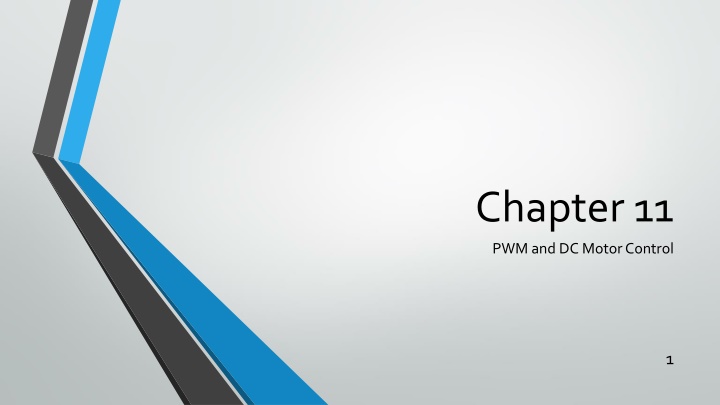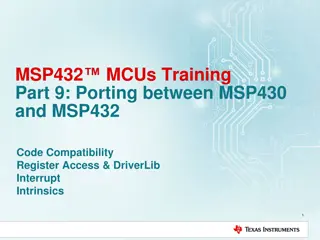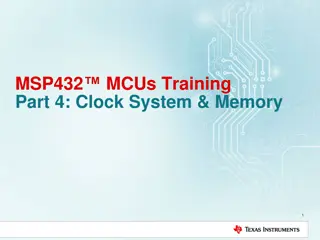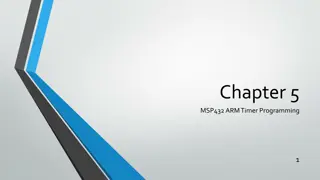
DC Motor Control Techniques and Configurations
Explore various DC motor control techniques such as PWM, H-Bridge configurations, transistor connections, and timer control registers with detailed images and explanations for effective motor control in projects.
Download Presentation

Please find below an Image/Link to download the presentation.
The content on the website is provided AS IS for your information and personal use only. It may not be sold, licensed, or shared on other websites without obtaining consent from the author. If you encounter any issues during the download, it is possible that the publisher has removed the file from their server.
You are allowed to download the files provided on this website for personal or commercial use, subject to the condition that they are used lawfully. All files are the property of their respective owners.
The content on the website is provided AS IS for your information and personal use only. It may not be sold, licensed, or shared on other websites without obtaining consent from the author.
E N D
Presentation Transcript
Chapter 11 PWM and DC Motor Control 1
Selected DC Motor Characteristics (http://www.Jameco.com) Part No. Nominal Volts Volt Range Current RPM Torque 154915CP 3 V 1.5 3 V 0.070 A 5,200 4.0 g-cm 154923CP 3 V 1.5 3 V 0.240 A 16,000 8.3 g-cm 177498CP 4.5 V 3 14 V 0.150 A 10,300 33.3 g-cm 181411CP 5 V 3 14 V 0.470 A 10,000 18.8 g-cm 3
H-Bridge Motor Counterclockwise Configuration 6
Some H-Bridge Logic Configurations Motor Operation Off Clockwise Counterclockwise Invalid SW1 Open Closed Open Closed SW2 Open Open Closed Closed SW3 Open Open Closed Closed SW4 Open Closed Open Closed 8
DC Motor Connection Using a Darlington Transistor 11
DC Motor Connection Using a MOSFET Transistor 12
TAxCTL (Timer_A Control Register) bit Name Description Timer-A Interrupt Flag 0: Timer did not overflow 1: Timer overflowed Timer_A Interrupt Enable (0: Disabled, 1: Enabled) 0 TAIFG 1 TAIE 2 TACLR Timer_A Clear Mode Control: 00: Stop mode: timer is halted 01: Up mode: Timer counts up to TAxCCR0 10: Continuous mode: Timer counts up to 0xFFFF 11: Up/down mode: Timer counts up to TAxCCR0 then down to 0. 4-5 MC 14
TAxCTL (Timer_A Control Register) (Cont.) bit 6-7 Name ID Description Input divider: These bits select the divider for the input clock: 00: divide by 1 01: divide by 2 10: divide by 4 11: divide by 8 TASSEL Timer_A clock Source Select: These bits select the Timer_A clock source: 00: TAxCLK (external clock): The timer uses external clock which is fed to the PM_TAxCLK pin. 01: ACLK (internal clock) 10: SMCLK (internal clock) 11: INCLK 8-9 15
TAxCCTLn Register bit 15-14 CM Name Description Capture mode 00: No capture 01: Capture on rising edge 10: Capture on falling edge 11: Capture on both rising and falling edges Capture/compare input select. These bits select the TAxCCR0 input signal: 00: CCIxA 01: CCIxB 10: GND 11: VCC Synchronize capture source. This bit is used to synchronize the capture input signal with the timer clock. 0: Asynchronous capture 1: Synchronous capture 13-12 CCIS 11 SCS 19
TAxCCTLn Register (Cont.) bit 10 Name SCCI Description Synchronized capture/compare input. The selected CCI input signal is latched with the EQUx signal and can be read via this bit. Capture mode 0: Compare mode 1: Capture mode Output mode. Modes 2, 3, 6, and 7 are not useful for TAxCCR0 because EQUx = EQU0 000: OUT bit value 001: Set 010: Toggle/reset 011: Set/reset 100: Toggle 101: Reset 110: Toggle/set 111: Reset/set 8 CAP 7-5 OUTMOD 20
TAxCCTLn Register (Cont.) bit 4 Name CCIE Description Capture/compare interrupt enable. This bit enables the interrupt request of the corresponding CCIFG flag. 0: Interrupt disabled 1: Interrupt enabled Capture/compare input. The selected input signal can be read by this bit. Output. For output mode 0, this bit directly controls the state of the output. 0: Output low 1: Output high Capture overflow. This bit indicates a capture overflow occurred. COV must be reset with software. 0: No capture overflow occurred 1: Capture overflow occurred Capture/compare interrupt flag 0: No interrupt pending 1: interrupt pending 3 2 CCI OUT 1 COV 21 0 CCIFG
Output Changes in Up and Continuous Modes OUTMO DE 001 010 output mode Set Toggle/Res et Set/Reset Toggle Reset Toggle/Set Reset/Set when EQUn rises (TAxR = TAxCCRn) sets the output toggles the output when EQU0 rises (TAxR = TAxCCR0) does nothing resets the output 011 100 101 110 111 sets the output toggles the output clears the output toggles the output clears the output clears the output does nothing does nothing sets the output sets the output 23
Output Modes in Up-Counting and Continuous-Counting 24
The PWM output for TAxCCR0 = 8, TAxCCRn = 5, Output Mode = Set/Reset (non-inverted) 29
Output Changes in Up-Down Mode OUTMOD E 001 010 mode when TAxR = TAxCCRn when TAxR = TAxCCR0 Set sets the output does nothing does nothing Toggle/Reset clears the output if the timer is increasing; otherwise, toggles. sets the output if the timer is decreasing toggles the output in all matches clears the output sets the output if the timer is increasing; otherwise, toggles. clears the output if the timer is decreasing 011 Set/Reset clears the output 100 101 110 Toggle Reset Toggle/Set does nothing does nothing does nothing 111 Reset/Set sets the output 30
Generated Waves in Different Output Modes in Up-Down Counting 31
The PWM output for TAxCCR0 = 7, TAxCCRn = 4, Toggle/Reset (non-inverted) 33
Dead band 35




